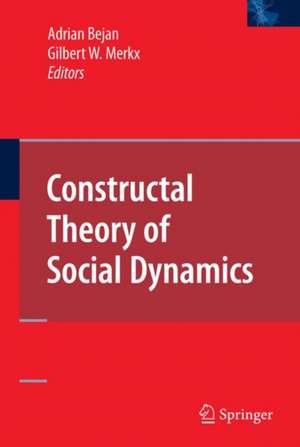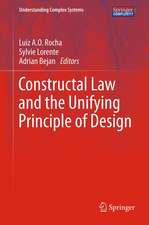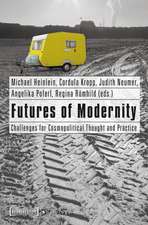Constructal Theory of Social Dynamics
Editat de Adrian Bejan, Gilbert W. Merkxen Limba Engleză Hardback – 14 aug 2007
Constructal theory predicts animal design and geophysical flows, and makes evolution a part of physics. In the social sciences, there is substantial literature based on the use of optima to deduce social, population and economic dynamics. The constructal approach of this book links social sciences with physics, biology and engineering. The book explores the deterministic principle that generates a broad array of patterned phenomena, in demography, geography, communications, hierarchy, and multiple scales. Examples are the distribution of living settlements, the occurrence of flow structure inside each settlement, ‘development’ as the relation between fast-flowing societies and advancement and wealth, migration patterns, and globalization.
Constructal Theory of Social Dynamics is novel and important because it puts the occurrence of social organization on a scientific basis. It brings social organization under the same physics principle that accounts for the generation of flow architecture (design) in geophysical flows, animal design, and engineered flows. This exploratory work adds a dose of determinism to the modeling and predicting of societal flows.
| Toate formatele și edițiile | Preț | Express |
|---|---|---|
| Paperback (1) | 1220.26 lei 6-8 săpt. | |
| Springer Us – 4 noi 2010 | 1220.26 lei 6-8 săpt. | |
| Hardback (1) | 1226.73 lei 6-8 săpt. | |
| Springer Us – 14 aug 2007 | 1226.73 lei 6-8 săpt. |
Preț: 1226.73 lei
Preț vechi: 1496.01 lei
-18% Nou
Puncte Express: 1840
Preț estimativ în valută:
234.77€ • 244.19$ • 193.81£
234.77€ • 244.19$ • 193.81£
Carte tipărită la comandă
Livrare economică 14-28 aprilie
Preluare comenzi: 021 569.72.76
Specificații
ISBN-13: 9780387476803
ISBN-10: 0387476806
Pagini: 350
Ilustrații: XVII, 350 p.
Dimensiuni: 155 x 235 x 23 mm
Greutate: 0.7 kg
Ediția:2007
Editura: Springer Us
Colecția Springer
Locul publicării:New York, NY, United States
ISBN-10: 0387476806
Pagini: 350
Ilustrații: XVII, 350 p.
Dimensiuni: 155 x 235 x 23 mm
Greutate: 0.7 kg
Ediția:2007
Editura: Springer Us
Colecția Springer
Locul publicării:New York, NY, United States
Public țintă
ResearchCuprins
The Constructal Law in Nature and Society.- Constructal Models in Social Processes.- Tree Flow Networks in Urban Design.- Natural Flow Patterns and Structured People Dynamics: A Constructal View.- Constructal Pattern Formation in Nature, Pedestrian Motion, and Epidemics Propagation.- The Constructal Nature of the Air Traffic System.- Sociological Theory, Constructal Theory, and Globalization.- Is Animal Learning Optimal?.- Conflict and Conciliation Dynamics.- Human Aging and Mortality.- Statistical Mechanical Models for Social Systems.- Discrete Exponential Family Models for Ethnic Residential Segregation.- Corporate Interlock.- Constructal Approach to Company Sustainability.- The Inequality Process Is an Evolutionary Process.- Constructal Theory of Written Language.- Life and Cognition.
Textul de pe ultima copertă
Constructal Theory of Social Dynamics brings together for the first time social scientists and engineers to develop a predictive theory of social organization, as a conglomerate of mating flows that morph in time to flow more easily (people, goods, money, energy, information). These flows have objectives (e.g., minimization of effort, travel time, cost), and the objectives clash with global constraints (space, time, resources). The result is organization (flow architecture) derived from one principle of configuration evolution in time (the constructal law): "for a flow system to persist in time, its configuration must morph such that it provides easier access to its streams."
Constructal theory predicts animal design and geophysical flows, and makes evolution a part of physics. In the social sciences, there is substantial literature based on the use of optima to deduce social, population and economic dynamics. The constructal approach of this book links social sciences with physics, biology and engineering. The book explores the deterministic principle that generates a broad array of patterned phenomena, in demography, geography, communications, hierarchy, and multiple scales. Examples are the distribution of living settlements, the occurrence of flow structure inside each settlement, ‘development’ as the relation between fast-flowing societies and advancement and wealth, migration patterns, and globalization.
Constructal Theory of Social Dynamics is novel and important because it puts the occurrence of social organization on a scientific basis. It brings social organization under the same physics principle that accounts for the generation of flow architecture (design) in geophysical flows, animal design, and engineered flows. This exploratory work adds a dose of determinism to the modeling and predicting of societal flows.
Constructal theory predicts animal design and geophysical flows, and makes evolution a part of physics. In the social sciences, there is substantial literature based on the use of optima to deduce social, population and economic dynamics. The constructal approach of this book links social sciences with physics, biology and engineering. The book explores the deterministic principle that generates a broad array of patterned phenomena, in demography, geography, communications, hierarchy, and multiple scales. Examples are the distribution of living settlements, the occurrence of flow structure inside each settlement, ‘development’ as the relation between fast-flowing societies and advancement and wealth, migration patterns, and globalization.
Constructal Theory of Social Dynamics is novel and important because it puts the occurrence of social organization on a scientific basis. It brings social organization under the same physics principle that accounts for the generation of flow architecture (design) in geophysical flows, animal design, and engineered flows. This exploratory work adds a dose of determinism to the modeling and predicting of societal flows.
Caracteristici
Combines for the first time theories of general physics and applies them to social sciences Offers a new way to look at social phenomena as part of natural phenomena A new domain of application of engineering such as thermodynamic optimization, thermoeconomics and "design as science" Discusses how the "flow architectures" of natural sciences are also found in social situations Both classes are covered by the same principle (the constructal law) First work to show that the concept of "efficiency" of engineering has a home in physics and social sciences The constructal law theory puts a scientific principle behind the major challenges of today and the future: sustainable development, energy sufficiency, equilibria between human settlements and environmental ecosystems, optimal allocation, optimal distribution of finite resources, etc.














